
Parallel ATA (PATA), originally AT Attachment, also known as Integrated Drive Electronics (IDE), is a standard interface designed for IBM PC-compatible computers. It was first developed by Western Digital and Compaq in 1986 for compatible hard drives and CD or DVD drives. The connection is used for storage devices such as hard disk drives, floppy disk drives, optical disc drives, and tape drives in computers.

In computing, BIOS is firmware used to provide runtime services for operating systems and programs and to perform hardware initialization during the booting process. The BIOS firmware comes pre-installed on an IBM PC or IBM PC compatible's system board and exists in some UEFI-based systems to maintain compatibility with operating systems that do not support UEFI native operation. The name originates from the Basic Input/Output System used in the CP/M operating system in 1975. The BIOS originally proprietary to the IBM PC has been reverse engineered by some companies looking to create compatible systems. The interface of that original system serves as a de facto standard.

Industry Standard Architecture (ISA) is the 16-bit internal bus of IBM PC/AT and similar computers based on the Intel 80286 and its immediate successors during the 1980s. The bus was (largely) backward compatible with the 8-bit bus of the 8088-based IBM PC, including the IBM PC/XT as well as IBM PC compatibles.
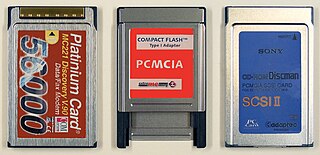
PC Card is a parallel peripheral interface for laptop computers and PDAs.
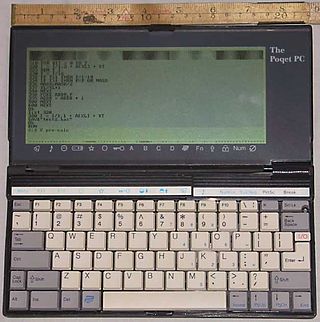
The Poqet PC is a very small, portable IBM PC compatible computer, introduced in 1989 by Poqet Computer Corporation with a price of $2000. The computer was discontinued after Fujitsu Ltd. bought Poqet Computer Corp. It was the first subnotebook form factor IBM PC compatible computer that ran MS-DOS. The Poqet PC is powered by two AA-size batteries. Through the use of aggressive power management, which includes stopping the CPU between keystrokes, the batteries are able to power the computer for anywhere between a couple of weeks and a couple of months, depending on usage. The computer also uses an "instant on" feature, such that after powering it down, it can be used again immediately without having to go through a full booting sequence. The Poqet PC is comparable to the HP 95LX/HP 100LX/HP 200LX and the Atari Portfolio handheld computers.
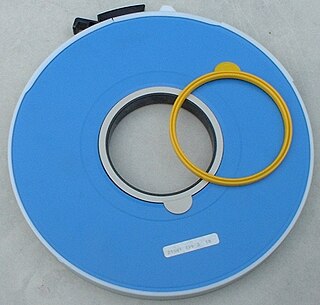
Write protection is any physical mechanism that prevents writing, modifying, or erasing data on a device. Most commercial software, audio and video on writeable media is write-protected when distributed.
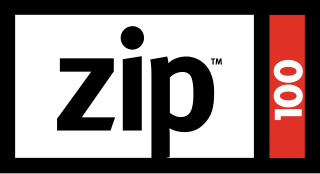
The Zip drive is a removable floppy disk storage system that was announced by Iomega in 1994 and began shipping in March 1995. Considered medium-to-high-capacity at the time of its release, Zip disks were originally launched with capacities of 100 MB, then 250 MB, and finally 750 MB.
In computing, a removable media is a data storage media that is designed to be readily inserted and removed from a system. Most early removable media, such as floppy disks and optical discs, require a dedicated read/write device to be installed in the computer, while others, such as USB flash drives, are plug-and-play with all the hardware required to read them built into the device, so only need a driver software to be installed in order to communicate with the device. Some removable media readers/drives are integrated into the computer case, while others are standalone devices that need to be additionally installed or connected.

A flash drive is a data storage device that includes flash memory with an integrated USB interface. A typical USB drive is removable, rewritable, and smaller than an optical disc, and usually weighs less than 30 g (1 oz). Since first offered for sale in late 2000, the storage capacities of USB drives range from 8 to 256 gigabytes (GB), 512 GB and 1 terabyte (TB). As of 2023, 2 TB flash drives were the largest currently in production. Some allow up to 100,000 write/erase cycles, depending on the exact type of memory chip used, and are thought to physically last between 10 and 100 years under normal circumstances.
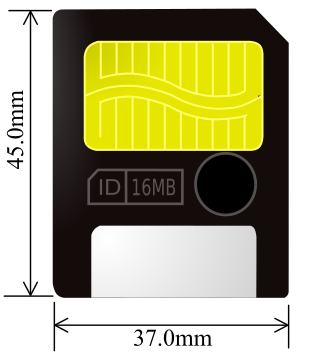
SmartMedia is an obsolete flash memory card standard owned by Toshiba, with capacities ranging from 2 MB to 128 MB. The format mostly saw application in the early 2000s in digital cameras and audio production. SmartMedia memory cards are no longer manufactured.

The USB mass storage device class is a set of computing communications protocols, specifically a USB Device Class, defined by the USB Implementers Forum that makes a USB device accessible to a host computing device and enables file transfers between the host and the USB device. To a host, the USB device acts as an external hard drive; the protocol set interfaces with a number of storage devices.

Verbatim is a brand for storage media and flash memory products currently owned by CMC Magnetics Corporation (CMC), a Taiwanese company that is known for optical disc manufacturing. Formerly a subsidiary of Mitsubishi Chemical, the global business and assets of Verbatim were sold to CMC Magnetics in 2019 at an estimated price of $32 million USD.
The PocketZip is a medium-capacity floppy disk storage system that was made by Iomega in 1999 that uses proprietary, small, very thin, 40 MB disks. Its relation to the original Zip drive and disk is the floppy medium and relatively much higher capacity than standard floppy disks. It was known as the "Clik!" drive until the click of death class action lawsuit regarding mass failures of Iomega's Zip drives. Thenceforth, it was renamed to PocketZip. A 100 MB Pocket Zip drive version had been in the works, was intended to be backwards compatible with the 40 MB disks, but ended up being vaporware and PocketZip itself would be discontinued as well.

Data I/O Corporation is a provider of manual and automated data programming and security provisioning systems for flash memory, microcontrollers, and logic devices. Founded in 1969 and incorporated in 1972, the company developed equipment that allowed electronic designers to program non-volatile semiconductor devices with data stored on punched cards or ASCII-encoded (eight-level) punched paper tape. These products were used for the design and manufacturing of systems used in industries such as IoT, medical development, and consumer electronics. Over the next three decades, the company was involved in technologies such as Bipolar, EPROM, EEPROM, NOR FLASH, Antifuse, FRAM, NAND FLASH, eMMC, and Universal Flash Storage (UFS) devices.
DriveSpace is a disk compression utility supplied with MS-DOS starting from version 6.0 in 1993 and ending in 2000 with the release of Windows Me. The purpose of DriveSpace is to increase the amount of data the user could store on disks by transparently compressing and decompressing data on-the-fly. It is primarily intended for use with hard drives, but use for floppy disks is also supported. This feature was removed in Windows XP and later.

M-Systems Ltd., was a Nasdaq-listed Israeli producer of flash memory storage products founded in 1989 by Dov Moran and Aryeh Mergi, based in Kfar Saba, Israel. They were best known for developing and patenting the first flash drive, marketed in 1995 as DiskOnChip, and the first USB flash drive, marketed in 2000 as DiskOnKey. They also created the patented True Flash Filing System (TrueFFS) which presented the flash memory as a disk drive to the computer. After 17 years of business, they were acquired by their prior competitor, SanDisk, in 2006. The DiskOnChip (DOC) was developed at the R&D Center established by M-Systems called EUROM. Rick Iorillo, Rony Levy and David Deitcher were the individuals that worked on the development and marketing of the first 2 MB DOC. This product went on to receive the Most Innovative Award from EDN in 1995 and later went on to become the Flash Drive and DiskOnKey.

Microsoft Corp. v. AT&T Corp., 550 U.S. 437 (2007), was a United States Supreme Court case in which the Supreme Court reversed a previous decision by the Federal Circuit and ruled in favor of Microsoft, holding that Microsoft was not liable for infringement on AT&T's patent under 35 U.S.C. § 271(f).
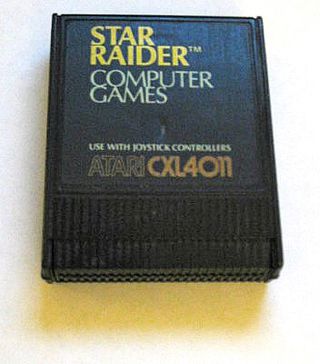
A ROM cartridge, usually referred to in context simply as a cartridge, cart, or card, is a replaceable part designed to be connected to a consumer electronics device such as a home computer, video game console or, to a lesser extent, electronic musical instruments.
Secure USB flash drives protect the data stored on them from access by unauthorized users. USB flash drive products have been on the market since 2000, and their use is increasing exponentially. As both consumers and businesses have increased demand for these drives, manufacturers are producing faster devices with greater data storage capacities.

Netac Technology Co., Ltd. is a Chinese data storage company headquartered in Shenzhen. The company claims to be the world's first inventor of USB flash drive, although that claim is disputed by IBM and other manufacturers.

















